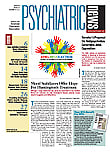The AMA is putting its weight behind an effort to designate individuals with intellectual disabilities as a medically under-served group.
At last month’s Interim Meeting of the AMA House of Delegates in New Orleans, delegates approved unanimously a report by the Council on Medical Services calling on the AMA to support a simplified process for designating individuals with intellectual disabilities as a medically under-served group. The Health Resources and Services Administration (HRSA) has been pursuing that designation, but—as the council report noted—the process has been slow.
The Patient Protection and Affordable Care Act requires HRSA to revamp and simplify its process for designating groups as medically underserved, and the agency has proposed a simplified process that has yet to be finalized.
Approval of the report lends the AMA’s support to establishing that simplified process. And it also requires existing AMA policy to replace the term “mentally retarded” with “intellectually disabled.”
The outcome of the house vote is largely the fruit of one activist psychiatrist’s efforts and is an example of how a motivated physician can influence AMA policy.
Psychiatrist Vijaya Appareddy, M.D., dates her interest in serving the intellectually disabled from her days in child and adolescent psychiatry training at Mount Sinai Medical Center. She was appointed by President George W. Bush to the President’s Committee on Intellectual Disabilities and served as vice chair from 2003 to 2006.
Appareddy, who is a delegate from the American Association of Physicians of Indian Origin as well as chair-elect of the AMA’s International Medical Graduate Governing Council, brought a resolution to the house at last year’s Interim Meeting in San Diego seeking support for designation of the intellectually disabled as medically underserved. After debate in reference committee hearings (where all resolutions and reports are aired prior to being submitted to the house for a final vote), the resolution was referred to the Council on Medical Services.
She said that the designation will serve to enhance access to and quality of health care services for the intellectually disabled by making federal dollars available for research and for training medical students and residents, for increasing payment to clinicians working with this population, and for enhancing family and community services.
“The AMA’s support carries a lot of weight because people pay attention to what the AMA endorses and supports,” she told Psychiatric News. “And it is important symbolically because every specialty and subspecialty is speaking with a unified voice, through the AMA, for increased services for this population.”
Appareddy also believes replacing the term “mentally retarded” with “intellectually disabled” in AMA policy is substantive, reflecting a challenge that can be overcome, rather than “something regressive that cannot be changed.” She noted that the name of the presidential advisory committee was changed by President Bush when he reauthorized the committee in 2003.
That committee originated under President John F. Kennedy and has been reauthorized by every president since then to advise the government about how to enhance services for the intellectually disabled. For Appareddy, service on the committee—which included members with disabilities—was transformative.
“Listening to what these individuals had to overcome to reach their goals was inspiring,” she told Psychiatric News. “Unless you treat these individuals and interact with them, it is hard to comprehend that they can be very productive and can contribute to society. They don’t have to be on the sidelines.”


